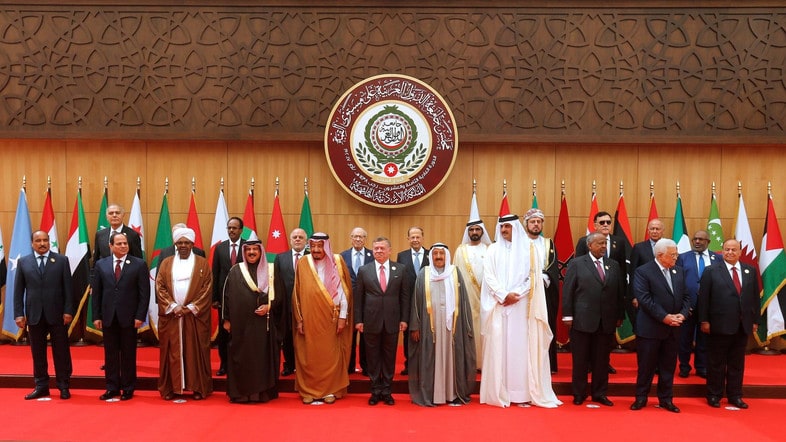On March 29, 2017, the day the 28th annual Arab League summit was held in Amman, former Jordanian foreign minister Marwan Al-Mu'asher published an article in the Jordanian daily Al-Ghad titled "The Summit [Closing] Statement I Dream of Reading." In it, he presented the closing statement he would have liked the summit to issue instead of the slogans familiar from previous summits about Arab unity, a two-state solution to the Israeli-Palestinian conflict and combatting ISIS. His alternative statement recognizes that the current crises in the Arab world result from built-in flaws in its political, economic and social governance, and presents a plan for mending these flaws that includes expanding citizen rights and freedom of speech, developing economic resources other than oil, and investment in improving education.
The following are excerpts from his alternative statement:[1]

Participants of the 28th Arab League summit (image: alarabiya.net)
"We, the kings and presidents of the Arab countries who convened today at the Dead Sea, will not suffice with reiterating the principles of the Arab ummah, the importance of joint Arab action, [our] insistence on the integrity of Syria's territory, on the two-state solution, and on increasing efforts to defeat ISIS militarily. Our summit today dealt with a difference topic that has never been on the agenda of any previous summit. Our summit takes place against the backdrop of intense waves of popular [unrest] whose consequences, which are still apparent to all, include internecine wars, sectarian conflicts, an economic downturn and threats to the safety of [our] citizens. We thought it proper to address this [popular] frustration and perform an accurate analysis of the factors that triggered it, in order to approve a suitable policy that will prevent further crises and set our countries on the correct course towards stability and prosperity.
"It must be acknowledged that there is a flaw in the political, economic and social governance of our countries, and that this flaw has increased the crisis of confidence between our citizens and our governments. We also understand that if the response to [the popular] protests will be further political restrictions or persistence in rentier economic methods, or disregard for the rule of law and for the principle of civil equality, this will only increase and aggravate the frustration of our citizens, both men and women. We [understand] that it is impossible to go back to the pre-2011 situation, since if we fail to address the factors that caused the Arab [Spring] revolutions, [these revolutions] will recur. We also understand that the absence of immediate magic solutions does not mean that we need not take serious action to restore the trust of the citizens in the state institutions and [need not] seriously reassess all the previous policies, which for the most part have not led to comprehensive and ongoing progress.
"The summit realizes that the security challenges facing the region cannot be met without a plan for progress as an alternative to all the extremist takfiri ideologies that prevail in the region. This plan is based on new social contracts between the state and [its] citizens and among citizens that will ensure participation in political decision-making and the rights of all sectors of society. The summit commits to initiating social dialogue in the Arab countries in order to formulate these [social] contracts...
"Realizing that... oil-based economy is coming to an end, the summit has resolved to undertake new economic measures, not based on oil, to increase productivity; to open the gates of mutual trade among all Arab countries; to remove bureaucratic and political obstacles that prevent this, and to promote the establishment of an Arab open market similar to the one in the EU.
"The summit knows that the problem of unemployment in the Arab world cannot be resolved without encouraging innovation and creativity. Developing societies that afford individuals freedom of thought, speech and innovation will lead to great progress not [only] in quality of life but also in growth, in [combatting] unemployment, and in improving the citizen's standards of living. The summit has therefore resolved to establish an education fund of 50 billion dollars to help Arab countries develop their curricula, foster critical thinking and train a young generation that can meet the challenges of the 21st century using 21st century skills...
"A journey of 1,000 miles begins with a dream."
[1] Al-Ghad (Jordan), March 29, 2107.




